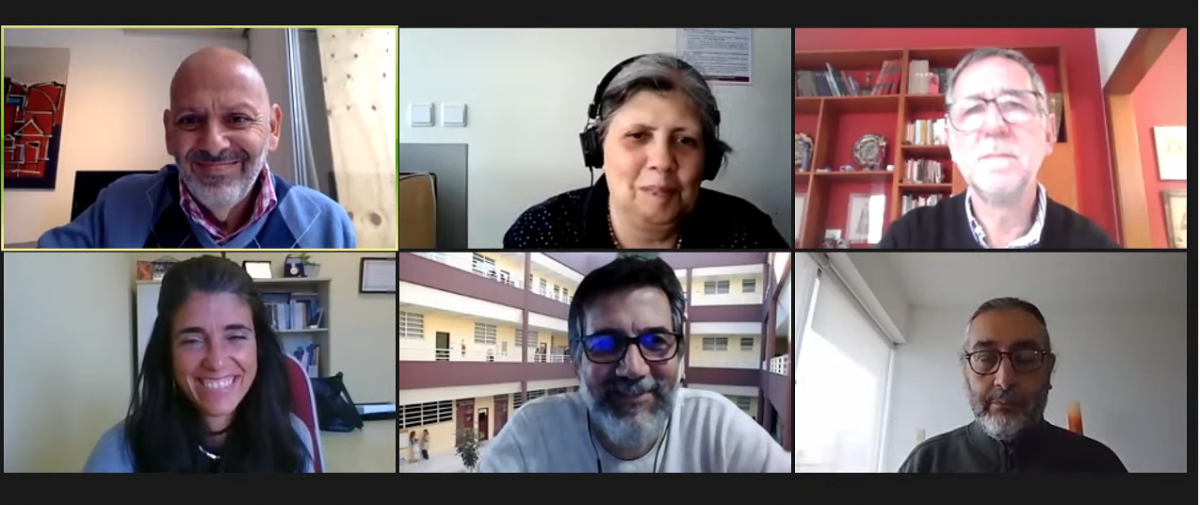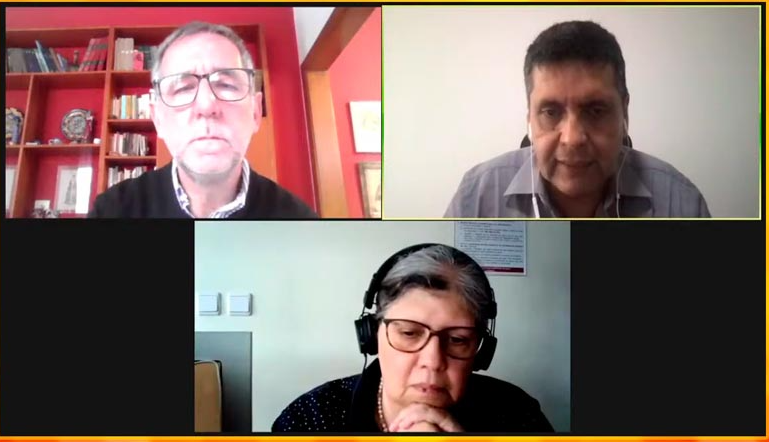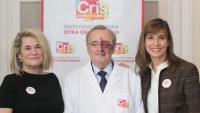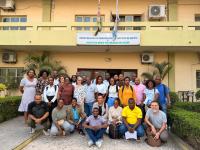EPSJV, RETS and their sub-networks begin a cycle of workshops on the challenges of training health technicians during the pandemic

As part of the work plan as WHO Collaborating Center for the Education of Health Technicians, the Escola Politécnica de Saúde Joaquim Venâncio (EPSJV/Fiocruz) started on July 6th the cycle of workshops 'The challenges of training health technicians during the pandemic'. The initiative is carried out in cooperation with the International Network for the Education of Health Technicians (RETS), the Ibero-American Network for the Education of Health Technicians (RIETS), and the Network of Technical Health Schools of the Community of Portuguese-speaking Countries (RETS-CPLP). The event also has the support of the Center for International relations in Health (Cris/Fiocruz) and VideoSaúde Distribuidora da Fiocruz.
The purpose of the initiative is to generate a space for exchange, reflection, learning, and formulation of proposals on the concrete experiences of how different training institutions have faced these challenges and achieved their goals.
In the view of EPSJV's International Cooperation coordinator, Carlos Batistella, the importance of the workshop cycle is justified in the emergence of the Covid-19 pandemic, which brought challenges to humanity. "It has put into question its models of economic and social development, and anthropocentrism itself. Knowingly, its most direct impact was felt in the health systems, exposing the weaknesses of the hospital care network, epidemiological surveillance, and primary care," he pointed out.
According to him, the expressive demand for professionals to face the disease has also demanded answers from the agencies and institutions responsible for health education. "However, with the adoption of the measures recommended by the WHO to control transmission, many schools and training centers started to develop their activities remotely, bringing immense ethical-political, pedagogical, and technological challenges never before faced for their actions," Batistella stressed, adding that it is in this context that networking becomes even more important: "The obstacles can certainly be overcome more easily if we try to learn from the experience of other institutions that have the same goals and are going through the same difficulties. The exchanges and sharing of strategies, proposals, and devices used in other realities allow the analysis of alternatives and the construction of specific policies in each country.
First Workshop
Held on July 6th, the first workshop of the cycle addressed the issue of "professionalizing practices" that cannot be done virtually. The general presentation was given by Sebastián Tobar, from the Center for International Relations in Health (Cris) at Fiocruz, who then gave the floor to Anamaria Corbo, director of EPSJV/Fiocruz, and Hernán Sepúlveda, advisor of Human Resources for Health of the Sub-Regional Office for South America of PAHO/WHO.
According to Anamaria, technical workers, in the scope of the Network, include the entire segment of workers in national health systems, which make up from the most elementary levels of schooling. "So, we are talking, for example, about ACS [community health workers], ACE [endemic disease control agents], and all those who have a technical qualification, in all their areas of activity, which can be at the secondary or high school level (which is how we call it here in Brazil) or at the university and non-university higher level, which is the reality in some other countries, and also those who make up the technological level of training, which would be at the higher level," she explained.
In Anamaria's view, there is certain invisibility of these professional categories, and this generates the need to establish technical cooperation at the national and international levels to promote and disseminate knowledge and exchange experiences, to qualify these workers to improve the qualification of the work and the quality of care in national health systems. "This situation, in the current pandemic context, becomes even more urgent. The pandemic will only exacerbate the inequalities that are part of our social formation. This brings a bigger challenge to all the institutions that are dedicated to doing, thinking, and executing the training of these workers, not only in terms of how to think about the training, in the context of the pandemic, of workers that are essential to face it, but also to think about the future impacts of the pandemic in the quality of life and in the mortality situation of the populations that are assisted by the national health systems", he added.
In his speech, Hernán shared an overview of the human resources situation in PAHO/WHO member states before the Covid-19 pandemic. According to him, despite initiatives, there was a lack of qualified human resources to accelerate the delivery of comprehensive health services and core public health functions and to address the social determinants of health. "There were also great inequalities in distribution, a lack of coherence between the model of care based on integrated networks of professionals and the model of education and training. As we know, there has always been a model based on hyper-specialization, biomedicals, and hospitals, in addition to inadequate financing, payment differences between subsystems and between countries. All this added to the idea of human resources seen as a cost and not as an investment", he stressed.
Based on this, Hernán pointed out that in 2017, all PAHO/WHO member states approved a human resources strategy for universal access and coverage in health. According to him, this strategy should be like a kind of guide for the development of HR policies and plans, following human rights principles, and with has three major lines of action." The first is to strengthen and consolidate governance in HR; the second is to address the conditions and capacity development for broad access and coverage with equality and quality, that is, to take care of maldistribution and think about how we reach with health professionals in all corners of our country," he said. And finally, reorient the education sector to respond to the needs of health systems in transformation processes towards universal health, that is, ask ourselves if we are training workers that our systems require. In light of this, the member states requested and then approved, in 2018, a regional Plan with specific objectives and with indicators to advance more quickly in this strategy.
Hernán presented three challenges for health technicians: comprehensive planning, the role of interprofessional teams, and training policies. According to him, until now few countries do comprehensive planning. Basically, they plan the number of doctors and specialists, at most some other professions. "But when we talk about integral planning, we have to look at the total number of health professionals, because they work synergistically. If we keep planning in one or two professions, we certainly cannot have a better response regarding health needs and demands. The challenge is also that we integrate all the health sectors and segments in the information systems", he pointed out.
Regarding the role of interprofessional teams, Hernán said it is necessary to strengthen the first level of care, basic health. "In the first level of care, we can solve 80% of the health needs. We have seen that the countries that faced the pandemic, strengthening this level of care, achieved better results than those who waited in the most critical stages," he said, adding that, precisely because of this, the role of health technicians is fundamental, because it is related to all the work of testing, monitoring, and insertion in these teams. Finally, about training policies, Hernán highlighted the need to reorient the curriculum, including all technical health professionals.
Experiências em Portugal e na Argentina

"Without any doubt, there is a combination of crisis, challenges and opportunities. A combination that is still not clear how long it will last, but that has changed the planning cycles in universal terms", said Gerardo Arturo Medina, from the National Learning Service (SENA/Colombia), starting the debate. This part of the program also brought together Professor Ana Almeida, from the Superior School of Health Technology of Lisbon (ESTeSL/Portugal) and Gabriel Muntaabski, from the National Institute of Technological Education (INET), which coordinates the National Training Program in Nursing of the Ministry of Education, Culture and Science and Technology of Argentina.
During the presentations, it was evident the efforts and solutions found by the countries in face of the pandemic context, such as the support to students through scholarships, equipment, and internet access packages, to more specific actions, such as the rescheduling of the school calendar, the adoption of hybrid teaching, with alternation of face-to-face and remote moments, the reduction of the time students stay in school, the diversification of internship fields (many of them made impossible by the priority in Covid-19 assistance), and the availability of face-to-face clinical simulation practices.
Ana showed the challenges of training health technicians at ESTeSL during the Covid-19 pandemic, emphasizing that it is possible to reorganize practice schedules to be able to comply with the curriculum. According to the professor, ESTeSL currently graduates nine four-year degrees, including one internship, among them, Biomedical Laboratory Sciences, which trains professionals in the areas of Clinical Analysis and Public Health and Pathological Anatomy, Cytology, and Thanatology. "The internships and clinical practices, which are mandatory, take place in several institutions such as public and private hospitals, municipalities, private clinics, companies, research centers, community pharmacies, and opticians," she said.
During the pandemic, Ana pointed out that the first semester of the 2019/2020 academic year took place from October 2019 to January 2020 without any problems. In February 2020, it was still possible to start the second semester, which had to be interrupted a month later. "That being the case, we decided to suspend internships on March 9 and face-to-face classes on the 13th. We suddenly had to adapt to teaching at a distance, and we made computers available to economically challenged students," she recalled.
Ana said that the biggest concern was in relation to internships and, in conversations with other institutions in the country, course coordinators committed themselves to approve and graduate students with 85% of the internship load completed. "However, during this time, the students had to do exercises and solve clinical cases at home, there was an effort on the part of the professors who accompanied these students and stimulated them in distance learning," she revealed.
About the organization of the 2020/2021 academic year, Ana presented that half of the class started going face-to-face, on an optional basis, and the other half continued remotely, already the practical classes occurred face-to-face for three hours one week and one hour of asynchronous class the other week. "Most internships were not suspended in the first semester, even during the time that the emergency was declared," she said, adding that as cases increased, the second semester was offered remotely from March 8 to April 26, when face-to-face classes resumed until the end in June 2021.
Throughout these two years, Ana reported that there was testing, punctually, of students before the beginning of the internship and throughout the school community with the return of face-to-face classes. "The pandemic presented obstacles that, with the commitment of students, teachers, non-teaching staff, internship advisors, and partner institutions, we were able to overcome, allowing our students to face the world of work confidently and hopefully," she concluded.
Next, Gabriel presented Argentina's experience in training nursing technicians during the Covid-19 pandemic. According to him, on March 19, 2020, all in-person teaching activities were suspended in the country, lasting practically the entire year. Due to the international health emergency, the Ministry of Education, through the National Program for Nursing Training (Pronafe) decided to accompany the nursing institutions, supporting their educational pathways. "This was done from the need to include new nurses in the health system, since they were already stressed by the pandemic and suffered with thousands of patients and the death of more than 200 nurses," he said.
The support for these educational paths, according to Gabriel, was done through two processes: virtual education and professional practices. According to him, Pronafe is in 221 public and private institutions. "There are more than 47,000 students in these schools around the country. We agreed, nationwide, that developed a document for the realization of simulated professionalizing practices in the 3rd year in higher technical education institutions that train nurses," he said.
The component of this national agreement happened through recommendations, a work plan, and a protocol. "In a process of dialogue, we concluded what were the skills and competencies that needed to be developed through practices in the context of the pandemic. Thus, we created a work plan for each institution to know the physical spaces, the number of teachers and students, the necessary equipment, etc. In addition to a Covid protocol in which all institutions developed their activities", he noted.
With this, continued Gabriel, the Federal Council of Education's Resolution #384 was made, which allowed the face-to-face simulated professionalizing practices. "Each province defined and standardized its resolutions and presented Pronafe with a work plan of practices," he said, adding that in this way Pronafe accompanies the institutions with a pedagogical, technical, and operational plan, generating homogeneity among the various experiences of the provinces. "In November 2020, then, simulated vocational practices began in classrooms, or virtually, or even in the field, such as vaccination work. And in June 2021, 6033 students graduated in Nursing," he concluded.
About the Workshop Cycle
The workshops will be held every 45 or 60 days, in Portuguese and Spanish, with a duration of two hours. The proposal is to present, in each workshop, the experiences made by members of the networks, to allow the disclosure, reflection, and debate, prioritizing the exchange among those present.
Based on the issues discussed, topics of interest for the next workshops will be defined. The proposal is that, as a product of the workshop cycle, a document summarizing the main issues presented will be prepared and disseminated. This document, which can be complemented with the videos that will be available on the internet, can become a tool to be used as a basis for your training strategies.
Watch the first workshop in its entirety::
-
In Portuguese: https://youtu.be/eppqTedTLLs
-
In Spanish: https://youtu.be/HB4MaHZUYgU
See the presentations:



